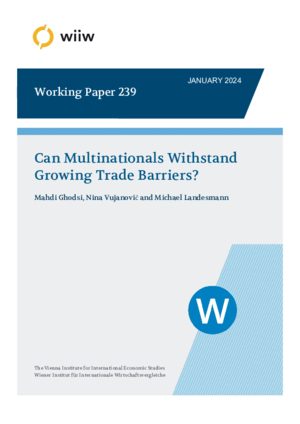Can Multinationals Withstand Growing Trade Barriers?
Mahdi Ghodsi, Michael Landesmann and Nina Vujanović
wiiw Working Paper No. 239, January 2024
43 pages including 7 Tables and 3 Figures
Multinational enterprises (MNEs) are increasingly dealing with challenges shaped by the new geopolitical and trade environments. Besides traditional tariffs, exporting firms need to comply with regulatory non-tariff measures (NTMs) in the form of technical barriers to trade (TBTs) and sanitary and phytosanitary (SPS) measures. Although trade costs associated with these policy measures affect all firms, implications could be multifaceted for multinationals that base their international activities on exporting and importing and are important for the formation of global supply chains. Applying Poisson pseudo maximum likelihood to the unique Orbis dataset of firms on multinational subsidiaries, we show that NTMs pose a greater challenge to MNEs’ subsidiaries’ activity and performance than tariffs do. High-tech manufacturing subsidiaries of foreign MNEs are particularly vulnerable to these NTMs, as they suffer higher regulatory losses. However, multinational affiliates that have higher productivity, those with full foreign ownership representation, those that are embedded within a larger international network of subsidiaries, and those that are located in trading partners with deep preferential trade agreements can turn these trade challenges to their advantage. Our results have important implications for policy makers regulating trade in goods.
Keywords: trade, FDI, global supply chains, tariffs, non-tariff barriers, multinational firms
JEL classification: F23, F21, F12, F13, F15, C55
Countries covered: non specific
Research Areas: International Trade, Competitiveness and FDI
